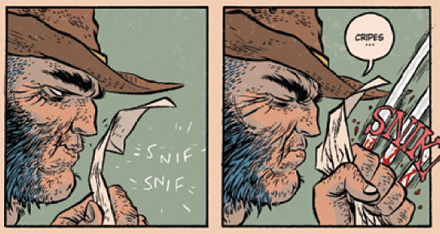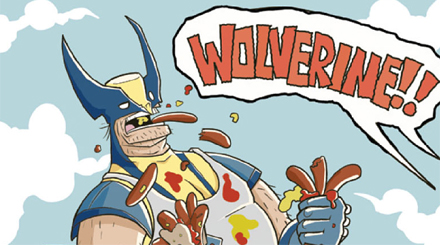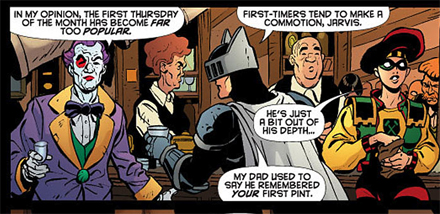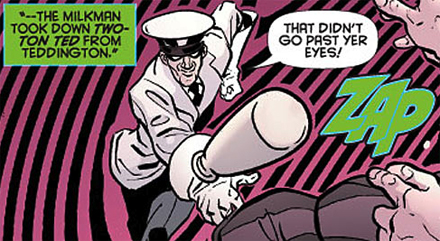This is what happens when Techland goes to the comic book store: we end up talking about what we picked up. This week, Douglas Wolk, Graeme McMillan, Evan Narcisse and Mike Williams discuss the debut issues of Strange Tales II and Knight & Squire.
DOUGLAS: I enjoyed last year’s incarnation of Strange Tales as an art-cartoonists-do-Marvel-characters anthology, but I liked the first issue of Strange Tales II better than any of the previous run. My favorite thing here has to be Kevin Huizenga’s piece with Wolverine and the Silver Surfer–partly because he actually managed to do a “Fight or Run” strip on Marvel’s dime, but mostly because of that amazing twist it takes on the final page to commenting on what’s involved with doing stuff on Marvel’s dime.
(More on Techland: A Brief History of “Strange Tales”)
GRAEME: YES. A million times yes. The Huizenga piece – and Kate Beaton’s – almost feels more like something that should’ve appeared in one of his Drawn & Quarterly books and accidentally ended up in here. The “The Dream Is Over!” line at the end was perfect.
DOUGLAS: A week after all the John Lennon reissues came out, no less! Other highlights: Gene Luen Yang’s sweet little piece about trusting fate; Nicholas Gurewitch’s excellent Galactus/Magneto gag (and what’s with everyone’s fascination with Galactus?); Dash Shaw’s crazy four-pager about Spider-Man and movie illusions–I checked, and the text on the final page is indeed a quote from Tobey Maguire about filming the kiss scene in the first Spider-Man movie. Rafael Grampá’s Wolverine piece doesn’t quite click for me as a story, but Jesus that guy can draw, and he sure loves his violence.

Mostly, I think the reason this incarnation works better than the first one is that that one often seemed to be the result of indie types trying to do gag stories with Marvel characters; this time, the indie types mostly seem to be doing the same sorts of things they would otherwise do, just with Marvel characters as their subjects. (The Kate Beaton piece, for instance, is a perfectly fine Hark! A Vagrant strip whose topic is Kraven the Hunter rather than, you know, “Wuthering Heights” or 17th-century Portugese politics.)
EVAN: Loved this. I missed the first Strange Tales mini, but this issue will make me go back and find the trade collection. (To me, that Nick Bertozzi Watcher story inside the front cover was the perviest thing in the book. And that’s saying something.) I really, really dug the Rafael Grampa Wolverine piece and, from a programming standpoint, thought it was a really strong way to open the issue. Maybe it’s because I’ve got a standing tradition of watching Monday Night Raw with friends every week or because it maps so closely to The Wrestler, but the Grampa Wolverine really entertained me. I loved the re-imaginings of the costumes and the framework of pro wrestling. And, yeah, the emotional underpinnings may be a bit trite, but the art really drove it home.
(More on Techland: The Comic Book Club: Thor #615)
It’s this kind of freshness that invents a new status quo. When you’re not worrying about continuity, you do a thing like the Kraven story. The implicit trippiness of old Dazzler comics can move to the foreground. It’s funny how Wolverine and the Silver Surfer popped up over and over again; that might just be testament to how that ‘outsider’ energy that characterized them still lingers or may have imprinted on these artists. I dunno, I may be over-investing here, but Strange Tales II #1 is giving me exactly what I wanted from Deadpool Max last week.
MIKE: I was really anticipating reading the Wolverine story by Grampá and then wading through the rest of this book. I could not have been happier with what I got instead. The execution on all of these stories was just perfect. They were the right length. They used enough familiar characters and situations that setup wasn’t needed. There was a tie for what made me smile the widest between the Kraven story and the Galactus/Magneto story. Kraven literally pouncing on a prom date in the middle of a meal was fantastic and easily my favorite joke in a book full of great jokes. Any readers of Perry Bible Fellowship are familiar with the impeccable comic timing of Gurewitch. It took me a moment to get the gag, but it’s classic PBF. It might even have too much setup. The final page could stand alone for the seasoned Marvel reader. But then we wouldn’t get that close up of the world devourer’s head in the first panel.
I too, would like to gush over Grampá’s story, if I may. The first thing Grampa’s work always makes me think of is Paul Pope and his similar loose, kinetic feel. After a page or two, though, I get past that and start to absorb the details and the humanity of these distinctly inhuman creatures. Like many of my favorite artists, it’s Grampa’s ability to choreograph that makes me stare at a page. It’s his sense of pacing. He knows when to shock with violence and when to linger.
I did wonder who Deadpool’s son is here. Who is his mother? Did Wade finally get together with Siryn? That’s just the Marvel fanboy in me talking. Oh, and Evan if you liked this wrestling story you should read a very short arc in Thunderbolts from a while back about a super powered fight club in Hoboken. It featured the Battler and Armadillo I think. Decent story, great art.

GRAEME: More than the first series, this really reminded me of DC’s Bizarro Comics books from… what, maybe a decade ago now?, where indie cartoonists did their thing with DC superheroes. It wasn’t as much of a gag book as the first Strange Tales, like Douglas says, but offered up the chance to make some of the characters shine much more than their “regular” incarnations – Jessica Abel and Dylan Horrocks’ Supergirl strip in particular, I seem to remember. Visually, this is a great collection – Grampá’s art is just AMAZING, and anything that has Kate Beaton, Dash Shaw and Kevin Huizenga is always going to look good to me – and storywise, there’s some really good stuff in here that really makes me wish, like Evan, that more of Marvel’s books offered the same kind of inventiveness and fun. If Marvel has to have three monthly Wolverine books, one should definitely be written by Jhonen Vasquez, you know?
DOUGLAS: Here I was, thinking that Paul Cornell was going to do the insanely huge amount of worldbuilding he was promising for his Knight & Squire miniseries in the background (along the lines of the rivalry between the Pearly King and King Coal in Batman and Robin), and instead he foregrounds it all–page after page of quick namechecks of characters, bricks of expository dialogue. Odd, though, that there didn’t seem to be much of a plot here, beyond “is the Sacha Baron Cohen character going to decide to be a hero or a villain?” And what I really miss from the Grant Morrison incarnation of the characters is the way Beryl and Cyril play off each other–they barely talk to each other in this issue.

I figure I’m missing most of the jokes in this issue (although I noticed a particularly smutty bit of Cockney rhyming slang on the first page). The only thing I actually cracked up at was the posh old U.K. Joker dismissing the idea of committing crimes as “infra dig.” And what was Wildcat doing in here, anyway? Is that another joke I missed? Help us, Graeme!
(More on Techland: “Deadpool” and “Daredevil: Black and White”)
GRAEME: You’re on your own with that one, I’m afraid – If Wildcat serves any purpose here other than “obligatory guest star,” I have next to no idea what it is. Maybe Cornell is a big fan of the old Bob Haney Brave and Bolds?
DOUGLAS: This is the sort of series I’d prefer to read in eight-page chunks in a Batman Family comic book–light comedy relief to counterbalance something else. As it is, I suppose it counterbalances a lot of the rest of the stuff I brought home from the store, but that’s not the same, somehow.
EVAN: I’m almost afraid to say it, but there’s a fair bit of camp in this Knight & Squire, amirite? It’s this weird inverted camp where the wackiness is super-serious. Don’t get me wrong; I liked it. Structurally, this issue kept me guessing. I figured the breaking of the truce magic was something that would be a through-line for the whole series. So, when the whole thing wound up being done-in-one, I was really surprised. That also made bolstered the old-school feeling of the proceedings.
It’s probably unfair to keep comparing Cornell and Morrison, but the set-up reminds me a lot of what Millar and Morrison did on Aztek: the long-tail history of a new venue alluded to in the background. But, as Douglas said, it all happens up front. (I also think that’s part of the Silver Age/camp vibe I’m getting here.)

And, man, even with all the glossary terms in the back, I was just drowning in all of the Brit-slang. It’s like the “do you speak jive” moment in Airplane!, only with capes and pints.
MIKE: Douglas, who had the rule that any comics taking place in the UK were not allowed to feature Big Ben or Parliament? Was that Morrison? As soon as I looked at the cover of this book, with the giant Big Ben in the background, I immediately thought of that broken rule. The first few interior pages go from breaking that rule to stomping on it with the parade of landmarks that scream “Hey, we are in London town!”
DOUGLAS: Yeah, I think the “no Big Ben” rule only applied to that Morrison/Cameron Stewart arc in Batman & Robin that was the last time we saw Knight & Squire at length…
MIKE: Like the rest of my co-clubbers that are based in the colonies, I missed much of the slang. Not all of it. I’ve had British coworkers in the past that have schooled me, and I’ve seen most of Guy Ritchie’s movies, haven’t I? I was surprised how much I enjoyed this story. I was worried that it was going to be a bit Scooby-Doo, and it was, but it pulled it off. This could have easily gone too far with the camp factor. As it was it reminded me of the flashback scenes in the Watchmen. A time when being a hero or a villain was a lifestyle choice, a scene anyone could potentially take part in. The fact that some of the people in this pub had actual devastating powers was incidental. The whole thing read as a glimpse into a strange culture instead of the usual super shenanigans.
The story really made me think of the current Real Life Super Hero movement that’s gaining momentum here in the States. Speaking of the U.S., I thought it was interesting that these characters were all acutely aware of the bigger-than-life superhero culture present across the pond. It was very telling that a visit from Superman would somehow validate the gathering.
(More on Techland: The Comic Book Club: “The Last Phantom” and “Set to Sea”)
GRAEME: Weirdly, that scene reminded me very much of Morrison’s early Animal Man comics, where Superman’s guest-shot becomes this odd meta thing that makes Buddy feel part of the superhero community, even if only for a second. The most interesting thing in this issue – which, for the most part, I found disappointingly underwhelming, in part because it really does feel like exposition in search of a plot for the most part – was the idea of British inferiority to America. “The only thing that stops us being ANYTHING is US. We say that’s an American thing so we don’t have to try” is, perhaps, a little too on-the-nose, but really captures something about the UK’s cultural inferiority complex, and puts a lot of the earlier world-building into a different context. (The Shrike’s attempt at aping US urban slang, Jarvis Poker’s Joker tribute, for two – Also, I love that he’s called Jarvis, not just for the Avengers/Iron Man tweak, but also the Jarvis Cocker reference that I read into it – and the “Just ‘cos he’s from AMERICA. We don’t have to hang on his every word–” about Wildcat.)
I guess the whole thing is very camp, but it’s… dull camp, maybe? It feels, more than anything, like a particularly uninspired entry in the Carry On series (Now, there’s a UK reference that probably means nothing to anyone in the US) – a flat, occasionally-amusing story filled with stereotypes that’s meant to be comforting in its familiarity for the initiated. It’s a shame; I’d really wanted it to be a lot more.

